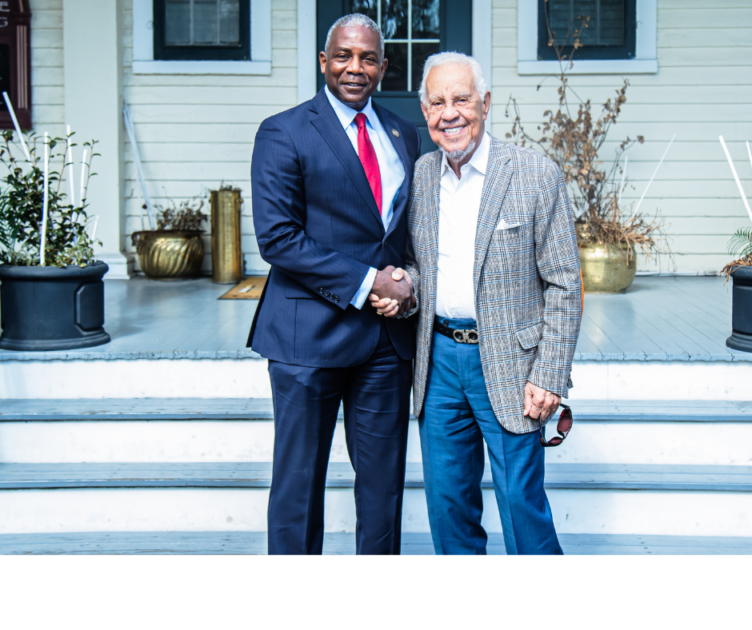Leveraging the power and priorities of Gen Z voters, advancing issues that matter on college campuses
By President Darrell K. Williams, Hampton University
As we approach another pivotal election season, I find it essential to reflect on the enduring significance of voting rights in America and the role of Historically Black Colleges and Universities (HBCUs) in amplifying the voices of the Black and brown communities. In the same way our ancestors fought tirelessly for the right to vote, today, we’re called to protect and exercise that right—a right that has the power to shape our future, our communities, and our country.
Since the beginning of HBCU existence, our institutions have been entrenched in the fight for voting rights. From hosting Freedom Rides and other student demonstrations, to being champions of change during the Civil Rights Movement, these schools have been regarded as anchor institutions, bastions of hope, and safe havens for communities across the country.

Hampton University, alongside the over 100 HBCUs across the nation, is committed to producing leaders who understand not only the value of civic engagement but also the profound impact their voices can make. Voting is more than a civic duty; it’s a form of empowerment. For students, particularly students of color, voting enables their collective voice to be heard in policies and decisions that directly affect their access to education and the resources to progress through their degree programs, their personal safety, economic opportunities, and more. As our university strives to deliver the #1 Student Experience in America, we wish to also provide a space where everyone’s freedoms are protected and respected.
In recent years, there has been renewed interest in federal support for HBCUs. From increased federal funding to initiatives designed to build capacity within minority-serving institutions, the current administration has made significant strides to uplift HBCUs. However, to realize sustained growth and success, these initiatives must continue, expand, and reach deeper into our communities not just for the next four years, but also for decades to come.
Students, faculty, and alumni of HBCUs are particularly attuned to the challenges our communities face—challenges often rooted in systemic inequalities. We see firsthand the need for better resources, greater economic opportunities, and equitable policies that recognize and address these disparities. By voting, we’re in a position to advocate for leaders who value the contributions of HBCUs and who prioritize continued investment in these institutions.
As countless college students prepare to vote for the first time, I want to acknowledge the issues and concerns that are most concerning for this group. Several issues are at stake during this election that are growing issues for students nationwide including economic stability, healthcare, student loan debt, reproductive rights, the infrastructure of the Department of Education and the need to advance educational equity, police reform, climate change, and more. These issues are felt by students of all ages and backgrounds which is why their vote will be essential in this election.
According to Campus Vote Project, historically, young adults have voted at lower rates than their older cohorts. They are also the newest members of our democracy, move more frequently, are less likely to have a driver’s license, and are less likely to be contacted directly by political campaigns then older age groups, all of which are barriers to registering and voting.

I’m confident that our students understand the gravity of this responsibility. Our voices are critical in holding leaders accountable and in demanding policies that support the communities HBCUs serve. In every election, we’re called to choose leaders who recognize our struggles and will take concrete steps to address them. By voting, we can advocate for comprehensive policies that uplift Black communities, protect civil rights, and ensure that HBCUs receive the resources necessary to continue transforming lives.
As a proud HBCU graduate, I too am forever indebted to my ‘Home by the Sea’ for the values that this great institution instilled in me. Without my HBCU education, many opportunities afforded to me would not have been a reality. From ascending the ranks in the U.S. Army to achieving great success in my corporate experiences, Hampton University played a monumental role in my life. Serving with the ROTC and becoming a member of Alpha Phi Alpha Fraternity Inc. were instrumental moments during my tenure that had a lasting impact on my life. These experiences and others taught me the value of showing up as my best self as a leader and global citizen of the world we live in.
When I was a student, organizations like the NAACP, the Urban League, and others led efforts to rally young voters. Today, as I reflect on my campus experience, I vividly recall the issues and problems that were facing communities of color and the sense of empowerment I felt going to the polls during my college days, believing that my vote had an impact on the future of this nation.
I urge our Hampton University community, and HBCU students across the nation, to vote with purpose. Our voices and our votes are instruments of change. They remind the nation that we are here, prepared to lead, and committed to securing a future where equality and opportunity are not privileges but rights afforded to all.
I’m proud of the commitment to community and justice that defines Hampton University and our sister HBCUs. Let us vote to ensure that our institutions continue to uplift and empower, that our communities receive the opportunities they deserve, and that the future we build together is one of equality, justice, and possibility.
Elevating Hampton Excellence
Hampton University’s strategic initiative is aimed at fostering a culture of academic rigor, innovation, and community engagement. Rooted in the University’s commitment to excellence, this 10-year plan seeks to enhance educational offerings, expand research opportunities, and empower students to become leaders in their fields. Through innovative programs, commitment to producing groundbreaking research, collaboration with industry partners, and a focus on social mobility, Elevating Hampton Excellence strives to create an inclusive environment where all students can thrive. This initiative embodies Hampton’s mission to transform lives, uplift communities, and elevate the collective potential of its students, faculty, and alumni.
About Hampton University
Hampton University, nestled along the scenic shores of Hampton, Virginia, is a dynamic historically Black institution with a storied legacy of academic excellence, pioneering research, and dedicated community service. Here, students discover an empowering environment that fuels their ambitions, nurtures their potential, and inspires them to rise, lead, and excel.
Founded in 1868, Hampton combines a robust liberal arts education with a strong emphasis on scientific and professional disciplines, offering a wide range of distinctive programs, including leading-edge degrees in STEM, business, arts, and health sciences. The University is at the forefront of research in areas such as atmospheric science, cancer treatment, and cybersecurity, driving innovation that impacts the world. Contributing $530 million annually to both the regional and the Commonwealth of Virginia’s economy, Hampton plays a vital role in regional development while championing diversity, inclusion, and opportunity.
Recognized by Money Magazine as one of the “Best Colleges in America” and honored by Coastal Virginia as the “Best Private College,” Hampton University is a close-knit community of learners and educators representing 44 states and 32 territories and nations. Committed to nurturing intellectual curiosity, critical thinking, and global citizenship, Hampton prepares its students to lead and thrive in an evolving world. For more information, visit www.hamptonu.edu.
For media inquiries, please contact Mahogany Waldon in the Office of University Relations, at mahogany.waldon@hamptonu.edu or 757-727-5987.
![]()
